An adapted groundwater quality index including toxicological critical pollutants
IF 4.9
Q2 ENGINEERING, ENVIRONMENTAL
引用次数: 0
Abstract
Water supply for population is mainly supported by groundwater. Its quality for drinking purposes is a worldwide major issue. Groundwater quality indexes are tools to assess its appropriateness for human consumption. This study evaluates the WAWQI index in North-Central Mexico with reported toxicological critical pollutants (arsenic, fluoride, and uranium) and put forward an adapted and optimized Groundwater Quality Index (GWQI). The research utilizes a dataset of groundwater parameters to analyze the chemical composition and suitability of groundwater (n = 121 samples) for drinking purposes. Arsenic concentrations fluctuate between 7.78 and 9798, average of 154 μg/L and only three samples within the Mexican guideline. Fluoride concentrations range from 0.01 to 2.2, average of 0.8 mg/L and 64% of the sample within the Mexican guideline. Uranium, not previously described in the region, show elevated concentrations in the range of 1.01–93.7 average of 11.4 μg/L and 88% within the WHO guideline. The WAWQI Index, applied to water samples, categorized samples as excellent and good status. However, 95%, 33%, and 11% of the samples are above As, F-, and U guidelines; therefore, a tailored GWQI for drinking water was proposed and optimized considering the WAWQI limitations. The outcome of the GWQI shows that only two samples classified with excellent status and are safe to drink without treatment. However, 119 samples were classified as poor, very poor, and unsuitable for drinking purposes. The GWQI provides a valuable tool for assessing groundwater quality in regions with similar hydrogeological conditions to the study area, and to identify areas requiring urgent attention to ensure safe drinking water supply. The study highlights the urgent need for sustainable water management practices to address the region's water quality challenges and ensure the long-term well-being of its population and fulfill the Sustainable Development Goal 6.

一种包括毒理学临界污染物的地下水水质指标
人口供水主要依靠地下水。它的饮用质量是一个世界性的大问题。地下水水质指标是评价地下水是否适合人类使用的工具。本研究以墨西哥中北部地区报告的毒性临界污染物(砷、氟化物和铀)评价了WAWQI指数,并提出了一个适应和优化的地下水质量指数(GWQI)。该研究利用地下水参数数据集来分析地下水(n = 121个样本)的化学成分和饮用适宜性。砷浓度在7.78和9798之间波动,平均为154 μg/L,只有三个样本符合墨西哥的标准。氟化物浓度范围为0.01至2.2,平均为0.8毫克/升,64%的样本符合墨西哥的指导方针。该地区以前未描述的铀浓度在1.01-93.7范围内升高,平均为11.4 μg/L,在世卫组织指导方针的88%范围内。WAWQI指数适用于水样,将水样分为优秀和良好状态。然而,95%、33%和11%的样本高于As、F-和U标准;因此,考虑到饮用水GWQI的局限性,提出了一种适合饮用水的GWQI,并进行了优化。GWQI的结果表明,只有两种样品被分类为良好状态,无需处理即可安全饮用。然而,119个样本被归类为劣质、非常劣质和不适合饮用。GWQI为评价与研究区水文地质条件相似的地区的地下水质量,确定需要紧急关注的地区以确保安全饮用水供应提供了一个有价值的工具。该研究强调,迫切需要可持续的水管理实践,以应对该地区的水质挑战,确保其人口的长期福祉,并实现可持续发展目标6。
本文章由计算机程序翻译,如有差异,请以英文原文为准。
求助全文
约1分钟内获得全文
求助全文
来源期刊

Groundwater for Sustainable Development
Social Sciences-Geography, Planning and Development
CiteScore
11.50
自引率
10.20%
发文量
152
期刊介绍:
Groundwater for Sustainable Development is directed to different stakeholders and professionals, including government and non-governmental organizations, international funding agencies, universities, public water institutions, public health and other public/private sector professionals, and other relevant institutions. It is aimed at professionals, academics and students in the fields of disciplines such as: groundwater and its connection to surface hydrology and environment, soil sciences, engineering, ecology, microbiology, atmospheric sciences, analytical chemistry, hydro-engineering, water technology, environmental ethics, economics, public health, policy, as well as social sciences, legal disciplines, or any other area connected with water issues. The objectives of this journal are to facilitate: • The improvement of effective and sustainable management of water resources across the globe. • The improvement of human access to groundwater resources in adequate quantity and good quality. • The meeting of the increasing demand for drinking and irrigation water needed for food security to contribute to a social and economically sound human development. • The creation of a global inter- and multidisciplinary platform and forum to improve our understanding of groundwater resources and to advocate their effective and sustainable management and protection against contamination. • Interdisciplinary information exchange and to stimulate scientific research in the fields of groundwater related sciences and social and health sciences required to achieve the United Nations Millennium Development Goals for sustainable development.
 求助内容:
求助内容: 应助结果提醒方式:
应助结果提醒方式:


